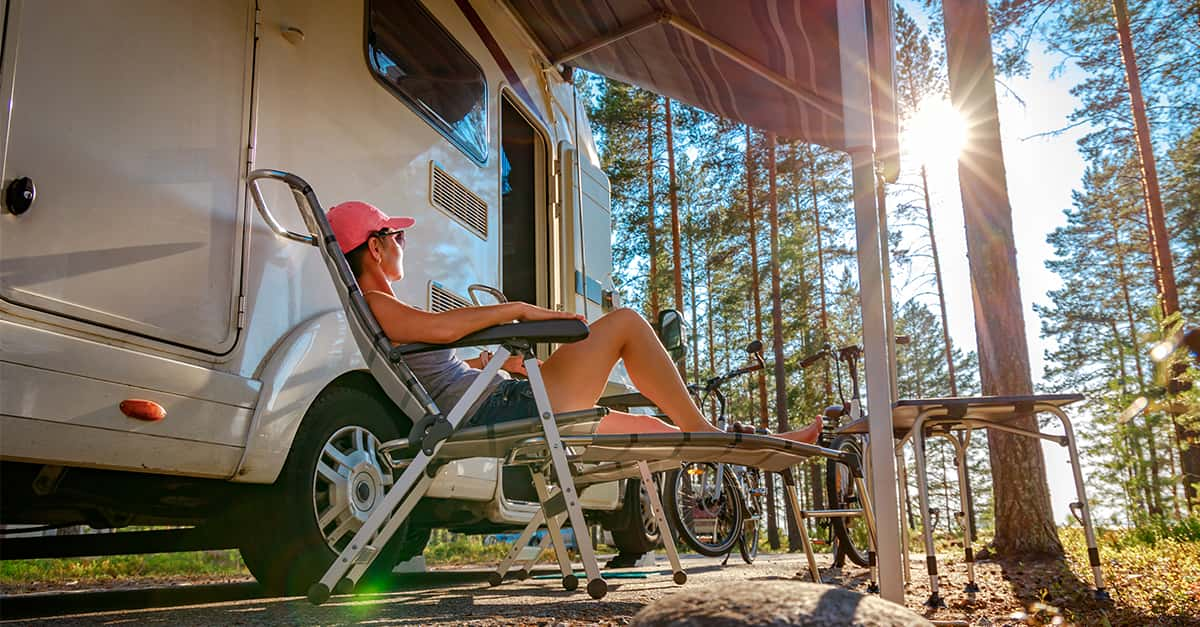Looking for the perfect RV for your family’s summer vacation? Here’s everything you need to know from size, price, and logistics before you get your RV.
Before looking at any RVs, you first need to ask yourself these questions: Can I afford to own an RV? How much can I spend? How will I be using it? This will help you make a checklist, and having a checklist will help keep you focused as you shop around. You’ll know what you’re looking for and have a goal to achieve while you consider your options.
Can I Afford to Own an RV?
Just like any other major purchase, there’s more to picking an RV than just choosing a trailer and handing over payment. RV ownership requires you to register your RV, and you should also be thinking about RV insurance as you prepare to buy the trailer of your dreams. This insurance is a blend of home and auto insurance. Moreover, it can include things like pet injuries, roadside assistance, vacation liability, and more depending on your lifestyle and use.
How Much Can I Spend on an RV?
New RVs can cost anywhere from $50,000 to $200,000 depending on luxuries, add-ons, makes, and models. However, it can be as low as $10,000 and as high as $300,000. The price for pop-up campers, for example, starts around a little more than $7,000. The price for a low-end travel trailer that you can attach to your vehicle starts at about $14,000. The bigger and more sophisticated the amenities an RV has, the higher the price.
But though you might shop around for used RVs, there are still other expenses to consider. One is whether or not you want to be able to hitch your RV to your car. Hitching your RV can be more convenient for you than having an entire separate vehicle, but not all RV hitches are made equal. Although some RVs are made with factory-installed hitches, you may need to upgrade your hitch and have the new one installed to fit your needs. This can cost anywhere from $300 to over $1,000 to pay both for the part and the installation.
How WillI Be Using My RV?
Driving your RV as a vehicle will mean you’ll face the same risks as any driving any other car such as dents, bumps, scratches, and accidents. RV maintenance specialists are qualified to fix these issues best, and keeping your vehicle in working order is different than maintaining your car. Additionally, if you’ll be using it all year, you'll also need to get it winterized.
Over time with multiple passengers and regular usage, your RV won’t look as brand-new as it did before, and will also need some care and work. These will likely be small repairs like a stuck cupboard door or a leak. Still, only time will tell. Keep a special budget for these unexpected expenses.
The final thing to consider when creating your budget is how you’ll be storing your RV, which may raise the biggest issue depending on where you live. If you’ll be living in your RV throughout the year, you’ll have to consider camping ground and park fees to stay overnight. Living in the city cuts affordable storage options short, and you may need to pay high fees for storage when you’re not using it, especially if you only expect to use it for part of the year.
Wrapping up Your Choice
Once you have a general budget set, you can make a list of needs and wants. The needs should be based on what you plan on doing. If you’re looking for something that you can drive and live in, you’ll have to consider fuel choices. Moreover, travelling with a family will require adequate space to accommodate everybody comfortably. The size of the vehicle will also affect the price of storage and campgrounds available.
It's a whole world out there to think about. Still, you don't need to get overwhelmed with all the options. Ultimately, choice is a good thing. As long as you know what you want, you can narrow down the potential options that are best for you. Above all, though, seasoned RVers are always advising potential new RVers who are interested in purchasing their own RV to shop around to make sure that they are getting the best deal possible.
This all involves lots of research, so you're in exactly the right place to look for your next outdoor adventure. Hopefully, this article has gone a long way to helping you plan it!











